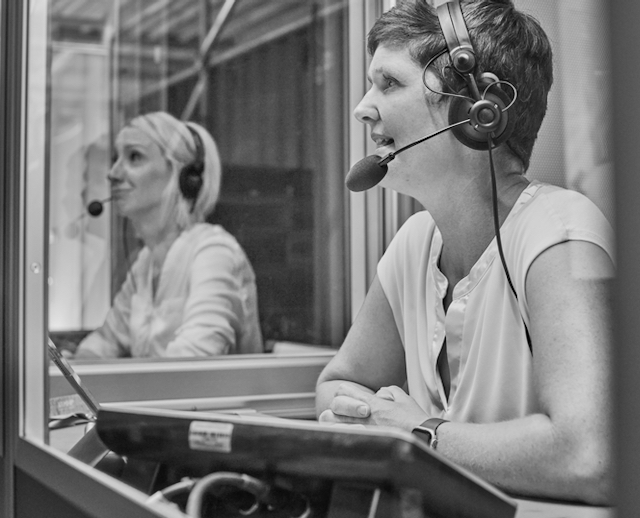

Interpreting is no different to sports – at the 100-metre sprint, 11-metre shoot out: performance must be right on target. That is what we stand for, the interpreters within the d-interp network.
The right type of interpreting for any environment
We interpret in the most varied situations: at conferences, expert discussions, negotiations, delegation trips or on television – in large exhibition halls, small seminar rooms or on the road. Due to the COVID-19 pandemic and social distancing, remote interpreting has also become much more widespread. Different types of interpreting are used in order to provide optimal support for communication in each of these situations.

„For a number of years, we have been competently supported by Ms Bentin and her colleagues at our media study tours. Our international guests, who come from all over the world, consistently bear testimony to the high quality of the simultaneous interpreting they provide.“ Clean Energy Wire
Simultaneous interpreting
Simultaneous interpreting is the most common type of interpreting and usually applies to multilingual conferences, specialist lectures, press conferences, on the television etc. Simultaneous interpreters convey the text into another language while the speaker is talking (hence simultaneous). That means no time is wasted.
Consecutive interpreting
During consecutive interpreting, the interpreter takes notes while the speaker is talking. Following a logical segment, they then reproduce this part of the speech into another language. Apart from a notebook, a pen and a microphone (where necessary), consecutive interpreting does not require any other technical equipment. This type of interpreting is appropriate for ceremonial receptions, short speeches or negotiations. It is important to factor in enough time for the interpretation.
Remote simultaneous interpreting
If participants cannot meet in person – for infection protection or other reasons – virtual meetings or video conferences using Zoom, WebEx, Teams or similar platforms can also be translated into different languages. So-called "interpreting hubs" can host the event, give technical support and provide the booths for the interpreters. Hybrid formats, in which one part of the audience meets on-site and the other part joins virtually, are also an option. Please contact us for more information or take a look at our blog (only in German).
Preparation is key
Our work begins long before the assignment in the form of technical and linguistic familiarisation. We explore the subject matter in-depth based on our own research and the materials that you provide. Depending on the subject, this preparation may take just as much time as the event itself. Since it is only possible to meaningfully interpret material that we have understood. At the end of the day, we want to be just as convincing as the experts are.
Simply get in contact with us via our contact form or write us an email to info@d-interp.de.
